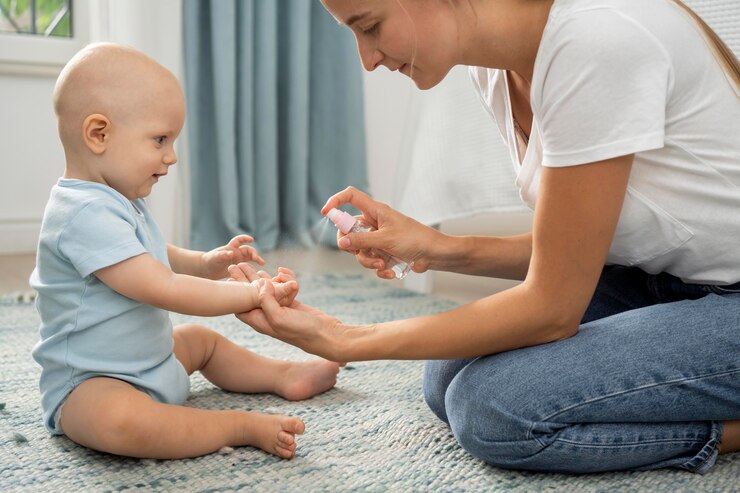
Keeping It Clean: A Guide to Baby Sanitizers and Essentials
Newborn babies are a blessing and a source of endless joy. But their arrival brings the immense responsibility of keeping them healthy and safe. One of the biggest concerns for parents is protecting their little ones from germs and illnesses. As a healthy immune system is key, proper hygiene practices play an important role in preventing the occurrence and spread of bacteria and different viruses.
However, exploring the variety of sanitizers can be daunting, especially when it comes to finding safe and effective solutions for babies. Their delicate skin and developing immune systems require a careful approach compared to adult sanitizers. In this article, we will guide you on how to choose the right baby sanitizers and essential hygiene practices to keep your little one clean and safe.
Understanding Baby's Delicate Needs
A baby's immune system is still under development, which makes them more receptive to germs and infections. Their skin is also thinner and more sensitive than an adult's. This means they can easily be irritated or dry by the contact of harsh chemicals on them. Adult sanitizers are often made up of high alcohol content and strong fragrances, which are simply not suitable for babies.
Although all sanitizers are made to keep germs away, it's important to remember that they cannot replace the importance of traditional hand washing. A proper hand wash with lukewarm water and a gentle baby soap is the most effective way to remove germs and prevent illnesses.
How to Choose the Right Baby Sanitizer?
Fortunately, there are baby-friendly hand sanitizer available for their delicate needs. These sanitizers typically contain lower alcohol content than adult options, often around 60% or less. You might find them fragrance-free and have moisturizing ingredients to prevent dryness.
Here are some key features to consider while choosing a baby sanitizer:
Alcohol Content: Look for a sanitizer with an alcohol content between 60% and 70%. While higher percentages are more effective at killing germs, they can be harsher on a baby's skin.
Fragrance-Free: Opt for fragrance-free sanitizers to avoid any potential irritation, especially for babies with sensitive skin.
Moisturizing Properties: Look for sanitizers that include ingredients like aloe Vera or glycerin, which can help keep your baby's skin soft and prevent dryness.
Safety Certifications: Choose a reputable brand that prioritizes baby safety and adheres to international safety standards.
Remember, while "best sanitizer in Pakistan" might be a common search term, focusing on reputable brands and prioritizing safety is key. Look for products with clear labeling and certifications from recognized institutions.
Essential Baby Care Products for a Clean and Protected Routine
While baby sanitizers are convenient for on-the-go cleaning, a holistic approach to baby hygiene is essential. Here are some additional baby care essentials that promote cleanliness:
Gentle Baby Wipes: These come in handy for quick cleanups during diaper changes, after playtime, or when soap and water aren't readily available. Choose wipes specifically designed for babies with hypoallergenic and fragrance-free formulas.
Disinfectant Sprays: Sanitizing surfaces where babies play and explore is crucial. Look for disinfectant sprays suitable for use around babies, ensuring they are safe for surfaces that come in contact with little hands and mouths. Opt for sprays with child-proof locks and follow the manufacturer's instructions for safe use.
Safe Habits for a Healthy Baby: Building a Foundation
Teaching good hygiene habits early on promotes a healthy lifestyle for your child. Here are some ways to promote cleanliness:
Make Hand Wash a Fun: Sing a song or create a short rhyme while washing your baby's hands. This turns hand washing into a fun and engaging experience for them.
Lead by Example: Babies learn by observing. Wash your hands frequently in front of them and explain the importance of good hand hygiene.
Wipe Down Surfaces Regularly: Disinfect high-touch surfaces like changing tables, crib rails, and toys regularly. This helps minimize the risk of your baby coming into contact with germs.
Addressing Common Concerns
Traveling with a Baby:
When traveling with your baby, packing a travel-sized baby sanitizer and a pack of gentle baby wipes becomes even more crucial. Look for sanitizers in convenient sizes that fit easily in your diaper bag, and choose wipes with re-sealable packages to prevent them from drying out. Remember, frequent hand washing remains the best defense against germs, so utilize public restrooms whenever possible.
Teething Troubles:
As your baby starts teething, they'll naturally put everything in their mouths. While providing teethers and keeping surfaces clean is important, occasional exposure to germs can help strengthen their developing immune system. Focus on good hygiene practices and supervise playtime to minimize risks.
Conclusion
Creating a clean and healthy environment for your baby is an ongoing process filled with learning and adaptation. By prioritizing gentle sanitizing solutions and incorporating good hygiene practices into your daily routine, you're laying the foundation for a lifetime of healthy habits. Remember, your love and attentiveness are the most important ingredients in keeping your baby safe. Embrace this rewarding journey of parenthood, and enjoy every precious moment with your little one.
